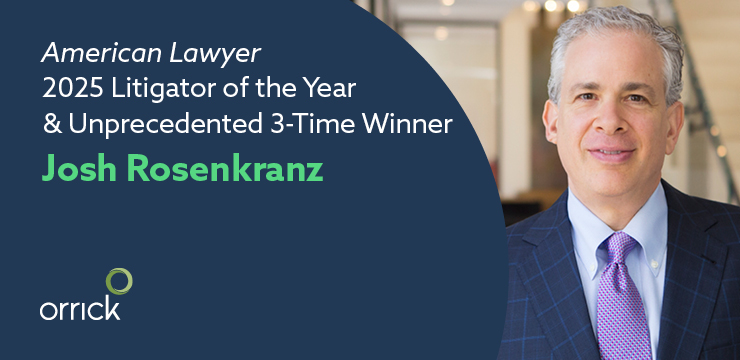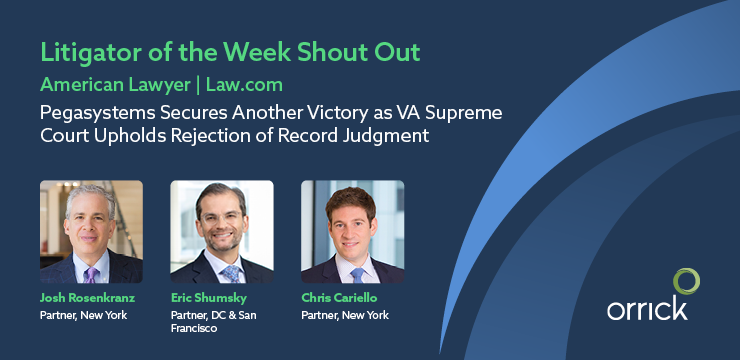
Josh Rosenkranz Is American Lawyer’s Litigator of the Year for an Unprecedented 3rd Time
In the span of only six months, Josh and his Orrick teams convinced appellate courts to overturn two mega verdicts.
Partner
New York

In the span of only six months, Josh and his Orrick teams convinced appellate courts to overturn two mega verdicts.
Josh Rosenkranz is head of the firm’s Supreme Court & Appellate practice.
A former law clerk to U.S. Supreme Court Justice William J. Brennan Jr. and then-Judge Antonin Scalia on the D.C. Circuit, Josh has personally argued more than 200 appeals in state and federal appellate courts across the nation, including 22 before the U.S. Supreme Court.
Josh was named American Lawyer’s “Litigator of the Year” in 2025. He is the only lawyer to have received this honor three times—only one other lawyer has been named twice—and he was also recognized as a finalist in 2022. In 2012, the magazine dubbed him “the Defibrillator” based on his streak of appellate wins for companies that “appeared to be at death’s door,” and in 2017 it declared, he “still deserves the moniker we once gave him.”
In 2014, The Financial Times named Josh one of the 10 most innovative lawyers in the North American legal sector for his work “demystify[ing] the technical issues” and securing a victory in the blockbuster Federal Circuit appeal, Oracle v. Google. Chambers USA has reported, “He wins accolades for his ‘brilliant analysis and judgment.’ Clients appreciate how he ‘rethinks every case from the ground up,’ and add: ‘He can take the most complicated legal or technological issue and present it in a way that seems like common sense.’” Another edition of Chambers USA added: “‘His briefs are quite simply beautiful,’” and “clients describe his courtroom presence as ‘both commanding and accessible at the same time.’ He has the ‘perfect combination of persuasiveness, intelligence, wit, and deference.’”
Josh's practice covers a wide range of subjects, including intellectual property, financial services, securities, privacy, antitrust, federal preemption, insurance law, corporate governance, criminal law, and constitutional litigation. Among his recent clients are Cisco, Credit Suisse, Cox Communications, DISH Network, Genentech, Gilead, Johnson & Johnson, JPMorgan Chase, Microsoft, Mozilla, Oracle, Sonos, and Royal Bank of Scotland.
Clients turn to Josh to win the highest stakes appeals, including appeals in cases that threaten the very survival of a business. For example:
Josh was the founding president and CEO of the Brennan Center for Justice at New York University School of Law, one of the country’s foremost public interest firms. Over the course of eight years, he was the Brennan Center’s chief strategist on litigation and public policy advocacy. Before that, Josh founded the Office of the Appellate Defender, a public defender office specializing in criminal appeals.
Highest-Stakes Supreme Court Engagements:
Representative Other Appeals:
Other Supreme Court Engagements:
6 minute read | March.17.2025

1 minute read | January.23.2026

2 minute read | November.18.2025
